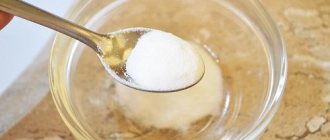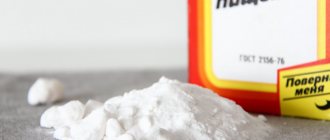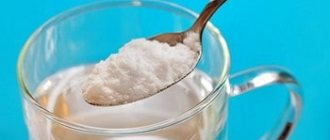How safe is it to use baking soda to treat certain diseases during pregnancy? How to carry out the procedures correctly, and are there any contraindications for treatment with soda? You will find answers to these questions in our article.
While expecting a baby, the expectant mother is faced with the problem of choosing a safe and effective treatment for a particular disease. Pregnancy often causes significant changes in a woman’s body, additional stress on the functioning of organs and systems, which entails unpleasant consequences.
Is soda harmful for pregnant women?
Methods of treating certain diseases with baking soda are considered completely safe and are widespread in folk medicine. But before using this remedy, you should find out whether it has contraindications associated with pregnancy.
- If we are talking about the external use of soda (foot baths for sweating and calluses, soda baths for inflammatory diseases, external hygiene procedures, gargling), then the use of this product is recognized as absolutely safe for the expectant mother and fetus.
- Doctors are concerned about cases where soda solution is taken orally. Soda is not a medicine, but only a means for preparing a weak alkaline solution. Under the influence of not always reliable information, the patient self-medicates and replaces effective drugs, for example, antibacterial and anti-inflammatory drugs, with soda treatment. This is done for reasons of possible harm caused by medications to the development of the baby. Inflammatory or infectious diseases that are not treated in time pose a great danger to the health of mother and child.
A pregnant woman must consult a doctor in a timely manner in case of any ailment and discuss all possible and acceptable methods of treatment.
For any type of ailment, a pregnant woman should consult a doctor
Indications for the procedure
Doctors recommend the procedure for the following diseases 3,4,5.
1. Sore throat (acute tonsillitis).
Acute tonsillitis is an infectious disease accompanied by inflammation of the tonsils. In children aged 3 to 7 years, bacteria are the cause in 77% of cases3,7. In adults, most sore throats are caused by viruses4, but subsequent activation of bacterial microflora leads to the development of a bacterial inflammatory process4.
In severe cases of tonsillitis, doctors immediately prescribe antibiotics3,7; local therapy complements general therapy and helps cleanse the tonsils. In mild cases of the disease, accompanied by moderate intoxication, low fever, slight redness and swelling of the tonsils and their arches, only local therapy is sufficient3. Of course, in such cases we are not talking about gargling with a soda solution - only about antiseptics specially designed for this.
Pharyngitis
Acute pharyngitis, or inflammation of the pharyngeal mucosa, is rarely isolated4. In the vast majority of cases it develops as part of the clinical picture
nasopharyngitis, that is, in addition to rhinitis during ARVI, or tonsillopharyngitis - in combination with inflammation of the tonsils4.
Viral pharyngitis is more common than bacterial pharyngitis. In this case, inflammation caused by viruses dominates only at the very beginning of the disease. Hypothermia, drinking cold drinks, inhaling dusty and chemically contaminated air, smoking and other factors that lead to irritation of the mucous membrane of the respiratory tract and decreased immunity often lead to the activation of opportunistic bacteria and the development of bacterial inflammation4. Isolated pharyngitis rarely takes a severe course, so systemic therapy is used only in exceptional cases4.
More often, doctors recommend local therapy - gargling.
Candidiasis of the oral cavity and pharynx
Yeast-like fungi of the genus Candida can be found in most people3. This microorganism belongs to the opportunistic representatives of the microflora and is activated only when immunity decreases3. The development of candidal stomatitis and pharyngomycosis is facilitated by intestinal dysbiosis and such severe general diseases as diabetes, cancer, and HIV infection. In addition, candidiasis often develops against the background of long-term use of antibiotics, as well as due to improper use of local glucocorticoids (sprays) for bronchial asthma3.
Small white “islands” appear on the mucous membrane, which increase in size and, merging, form films. Externally, the films resemble pus, but they are not removed; when they are rejected, red spots and erosions remain on the surface of the mucous membrane3. Swallowing liquids and food causes pain, which causes adults to lose their appetite, and small children to refuse to eat altogether. Along with antifungal agents, microflora-restoring prebiotics and probiotics, and immune-strengthening medications, local therapy is used3.
Up to contents
Can pregnant women drink baking soda for heartburn and how?
Heartburn is a fairly common occurrence when expecting a baby. It is believed that using baking soda helps to quickly get rid of this unpleasant condition. When in contact with gastric juice, soda quickly neutralizes the acid that causes heartburn and causes relief.
What happens next? From chemistry lessons we remember that soda is sodium bicarbonate. Once in the stomach, this substance interacts with hydrochloric acid, which leads to its decomposition into salt, water and carbon dioxide. Therefore, 15-20 minutes after drinking soda, carbon dioxide begins to expand the stomach, thereby provoking the rapid production of gastric juice and its reflux into the esophagus. Irritation of the mucous membrane causes a new attack of heartburn.
In the later stages, the stomach already experiences increased pressure from the growing uterus, so drinking soda with milk or water will not relieve heartburn, but will lead to additional discomfort and pain in the digestive system.
With your doctor's permission, use pharmaceutical remedies for heartburn - Rennie, Almagel, which do not pose a danger to the fetus.
Treating heartburn with baking soda during pregnancy is not recommended.
Is it possible to overdose?
An overdose of baking soda is practically impossible if the product is used within reasonable limits. In itself, it is not a toxic product, so it cannot harm the expectant mother and baby. But it is recommended to prepare a slightly alkaline solution from it for external use, and under no circumstances take soda internally for heartburn during pregnancy!
This is extremely undesirable, since in this case an overdose of sodium bicarbonate is possible, against which the expectant mother may feel unwell, increase blood pressure, edema and rapid heartbeat. Also, the mucous membranes of the esophagus, stomach and duodenum are seriously affected by the internal use of soda. If a pregnant woman unknowingly drank soda for heartburn, she needs to inform her doctor about it.
Baking soda helps to temporarily relieve toothache, throat discomfort, and eliminate signs of vaginal candidiasis, which significantly improves the well-being of the expectant mother with these problems. But you need to use it wisely. Only external use of the product is allowed; baking soda during pregnancy for heartburn is strictly prohibited.
Author: Olga Rogozhkina, obstetrician-gynecologist, especially for Mama66.ru
How to drink milk with soda and honey when pregnant women have a cough: recipe
While waiting for a baby, colds and infectious diseases with symptoms such as coughing pose a fairly serious danger. In addition to debilitating coughing attacks, this condition carries the risk of quickly progressing to a more severe form - bronchitis, pneumonia.
In addition, muscle tension that occurs with a strong cough is dangerous in case of pregnancy pathologies - uterine tone, low or complete placenta previa. In such cases, bleeding may begin and there is a risk of miscarriage. Therefore, treatment must be started immediately.
- Milk with the addition of soda helps reduce swelling of the mucous membranes caused by the inflammatory process and helps remove mucus from the lungs and bronchi. This remedy is acceptable and will help in case of dry cough. After the cough turns into a wet one and actively produces sputum, the soda solution will not have any effect.
- To prepare the solution, boil 1 glass of fresh milk, add 1⁄4 teaspoon of soda, mix thoroughly.
- If you are not allergic to bee products, you can add 1 teaspoon of liquid natural honey to the soda solution and stir well until completely dissolved.
- Another component for preparing a cough drink is butter, which has an enveloping and mucolytic effect. If such a product does not cause disgust and vomiting, add a small piece of butter.
- The finished drink should be taken warm, 1⁄2 glasses each - in the morning on an empty stomach half an hour before meals and in the evening before bed.
A drink made from milk and soda for coughs in pregnant women
Gargling - baking soda, salt, iodine during pregnancy: solution recipe
During pregnancy, most drugs based on medicinal and herbal components are contraindicated. For sore throat caused by sore throat, against the background of acute respiratory viral infections, acute respiratory infections or influenza, gargling with soda is a simple, effective and affordable remedy.
- A soda solution helps relieve swelling of the mucous membrane, has a local antibacterial and anti-inflammatory effect, and helps wash out bacteria. This remedy is also effective for laryngitis, stomatitis, tonsillitis, and pharyngitis.
- To prepare a rinse, add 1/2 teaspoon of baking soda, 1/2 teaspoon of table salt and 2-3 drops of alcohol tincture of iodine to a glass of warm boiled water. You can gargle up to 3-4 times a day, not forgetting that the gargle should be warm (38-40°C).
Gargling with baking soda is an effective and safe remedy for treating sore throat.
Use for heartburn
Heartburn during pregnancy is common. A burning sensation and a sour taste in the mouth are familiar to many expectant mothers. A soda solution helps to quickly cope with the problem and eliminate unpleasant symptoms.
The effect of heartburn is weakened by a folk remedy that neutralizes acid, which is the source of fire in the chest. But is it safe to use the method during pregnancy? No!
Sodium bicarbonate, accumulating in the body, causes swelling and irritates the intestinal mucosa. The traditional method should be used only in rare cases.
It is important to prepare the medicinal drink correctly: add a couple of pinches of baking soda to a glass of milk. Afterwards, the resulting product should be drunk. The folk method extinguishes heartburn instantly. However, this is only apparent relief.
Is it possible for pregnant women to breathe over baking soda or do inhalations?
Soda solution for inhalation for colds and viral diseases is actively used in medical practice. Such procedures can eliminate cough, catarrhal symptoms, pain and sore throat. During pregnancy, this remedy is absolutely safe, since the principle of inhalation is that particles of the substance enter the inflamed mucous membranes of the respiratory tract without affecting other organs.
- Inhalations with baking soda can be carried out in 2 ways - the method of our grandmothers using a saucepan or kettle with hot water, or using a special inhalation device (nebulizer).
- To prepare the solution, take 1 tbsp. spoon of soda per 1 liter of water, you can add 2 drops of iodine.
Please note the general rules for the procedure:
- Inhalation should not last more than 10 minutes 2 times a day.
- The procedure should not be carried out immediately after eating or at elevated body temperature.
- After inhalation, it is not recommended to eat, talk, or go outside for 1 hour.
- If you are using a saucepan, lean over it and cover your head with a towel. The water temperature should not exceed 60ºС.
- Insert a funnel made of paper into the spout of the kettle and lean as close as possible.
- Carrying out the procedure using a nebulizer is much preferable, since spraying occurs in a “cold” way, which eliminates the risk of burns to the mucous membranes under the influence of hot steam.
- After noticeable signs of improvement in the patient’s condition appear, inhalation should be stopped, since prolonged exposure to soda vapor can have a drying effect on the mucous membranes.
Inhalations with soda are recommended for pregnant women with colds
General principles of rinsing
Its undoubted advantage is the lack of systemic action. The components of the solutions are practically not absorbed, do not penetrate into the general bloodstream, and do not affect the functioning of the organs and systems of the body3,4. This allows the procedure to be used not only in the treatment of adults, but also in children and pregnant women3.
The generally accepted local procedure has a versatile effect.
- Mechanical cleansing of the mucous membrane. More precisely, its disposal of pathogenic microorganisms, mucus and pus, which contains pathogens and toxins formed as a result of their vital activity 3.4. By the way, this basically limits the effect when gargling with soda for a child or adult.
- Antiseptic effect. Pharmaceutical preparations contain components that have a detrimental effect on most bacteria, viruses and fungi, which most often cause diseases of the pharynx and oral cavity4,5.
- Creating conditions unfavorable for the proliferation of microbes. The normal acidity of human body tissues ranges from pH 7.32 to 7.45, which corresponds to an alkaline environment. Inflammation, especially purulent inflammation, is accompanied by acidification of tissues and a decrease in pH to 6.5-5.39, which contributes to the further development of infection1. Many rinses alkalize the environment and create conditions unfavorable for the development of viruses and bacteria1, but the majority of drugs inhibit the growth of bacteria due to the action of their antiseptic component3.4.
- Pain relief. Of course, when gargling with baking soda, you can’t really count on relieving a sore throat. But the use of pharmaceutical preparations specially designed for this purpose, containing local anesthetics, can significantly alleviate suffering3,4.
- Reducing signs of inflammation. The action of the medicine leads to a decrease in swelling, pain and redness of the inflamed mucous membrane. At the same time, discomfort in the oral cavity, sore throat and cough caused by irritation of the receptors of the upper respiratory tract are reduced.
- Thinning mucus and making it easier to expectorate4. Some solutions dilute sputum by shifting the pH of mucus to the alkaline side, others contain special components that reduce the viscosity of mucus and thereby facilitate its removal4.5.
Up to contents
Can pregnant women douche with baking soda?
Douching is a medical procedure performed according to the indications and prescription of a doctor. In gynecological practice, this treatment method is used for infectious and inflammatory diseases of the genital tract and genitourinary system.
There is no consensus on the advisability of this method of treatment during pregnancy. Arguments in favor of banning douching in pregnant women include the following concerns:
- Pathogenic organisms enter the cervix along with the fluid that washes the infection out of the vagina, which entails the risk of intrauterine infection and premature termination of pregnancy.
- Washing out the natural microflora of the vagina and reducing protective functions, which can lead to the development of other infections and inflammatory processes of the genital organs.
Be sure to discuss the need for douching with your doctor. If such procedures are recommended, follow all the rules:
- Prepare a solution of baking soda in the proportion of 1 tbsp. spoon of powder per 1 liter of warm boiled water.
- Instruments and nozzles for douching must be sterile.
- The liquid must be administered under minimal pressure. The temperature of the solution should be approximately equal to body temperature.
The need and contraindications for douching with soda during pregnancy should be discussed with a gynecologist.
Thrush during pregnancy. How to avoid risks?
All countries around the world have seen high rates of growth in vaginal infections in recent years. The leading place among them is occupied by candidiasis or thrush .
Pregnant women often experience thrush. Despite its apparent harmlessness, thrush can pose a serious threat: it complicates the course of pregnancy and puts the health of mother and baby at risk.
Normal vaginal microflora during pregnancy
Olga Sergeevna Derdyay, an obstetrician-gynecologist at the Za Rozhdenie clinic, tells the story.
The vaginal microflora in a healthy woman is represented by lactobacilli (Doderlein bacilli), which make up 95-98% of all vaginal microbes.
Lactobacilli perform a protective function, preventing the proliferation of pathogenic microflora and fungi. The protective properties of lactobacilli are realized in different ways: they displace pathogenic flora, preventing it from attaching to the epithelium of the vaginal mucosa, prevent the proliferation of pathogenic bacteria due to the production of lysozyme and hydrogen peroxide, and also in the process of vital activity, they secrete lactic acid, thanks to which an acidic environment is maintained during vagina (pH 3.8-4.4), necessary to suppress harmful bacteria
- During pregnancy, hormonal changes occur that promote the growth of normal vaginal microflora: an increase in estrogen levels leads to an increase in the number of epithelial cells on the vaginal mucosa and the accumulation of glycogen in them.
- Glycogen is broken down by lactobacilli to form lactic acid, which promotes the proliferation of normal flora and the displacement of pathogenic flora. In a healthy pregnant woman, the number of lactobacilli increases by the time of delivery.
Thus, when passing through the birth canal, the child receives useful lactoflora, which will serve as protection against pathogenic microorganisms.
BUT! modern life makes its own adjustments: stress, the use of antibiotics, chronic diseases, poor ecology prevent the proliferation of lactobacilli and pathogenic bacteria and fungi take the place of normal microflora.
Thrush “loves” pregnant women
Almost half of pregnant women (40-46%) experience signs of thrush (vulvovaginal candidiasis) during pregnancy, and for many this happens for the first time in their lives.
Thrush is caused by yeast fungi of the genus Candida, which belong to the opportunistic microflora. The occurrence of thrush during pregnancy is facilitated by changes in hormonal levels. With a decrease in the number of lactobacilli, the glycogen content in the vaginal epithelium increases, which leads to the proliferation of fungi. Progesterone, a pregnancy-preserving hormone, inhibits a woman’s immune system, which also leads to a decrease in the protective function of the normal vaginal microflora.
Thrush during pregnancy - it’s important not to miss it
The characteristic clinical symptoms of thrush are:
- Itching
- Curd-like discharge from the vagina.
Itching may intensify in the afternoon, before bed, after taking a bath or shower, long walking, or sexual intercourse.
The discharge can be either abundant or scanty, it all depends on the volume of the lesion and the presence of accompanying microflora. However, during pregnancy, the clinic can be erased and women note only discomfort in the vagina or in the area of the external genitalia.
The diagnosis of vulvovaginal candidiasis is confirmed using microbiological research methods (microscopy of smears of vaginal discharge), their diagnostic value reaches 95%.
- Microscopic examination of smears is one of the simplest and most accessible methods for diagnosing candidiasis. The vaginal contents are applied to glass, dried, stained and examined under a microscope.
- If Candida fungi are present in quantities <104 CFU/ml, and there are no clinical symptoms of thrush, then this condition is defined as candidiasis.
- If Candida fungi are present >104 CFU/ml and there are symptoms of the disease, a diagnosis of vulvovaginal candidiasis is made. During pregnancy, a smear for vaginal microflora is taken three times, in the 1st, 2nd and 3rd trimesters; its results are especially important immediately before childbirth (at 36 weeks).
Why is treatment necessary?
Any vaginal infection, including candidiasis, during pregnancy and childbirth is dangerous and requires proper treatment. Vulvovaginal candidiasis is associated with an increased risk of a number of complications of pregnancy and childbirth:
- The likelihood of spontaneous miscarriage in the early stages and premature birth increases;
- Infection during pregnancy can spread to the fetus and membranes, causing amnionitis (infection of the amniotic fluid) or chorioamnionitis (inflammation of the membranes); • Increases the risk of hypoxia (oxygen deficiency) of the fetus;
- The risk of intrauterine growth retardation and the birth of a child with low body weight increases;
- Premature discharge of amniotic fluid;
- The risk of postpartum infection increases, in particular endometritis (inflammation of the uterus);
- Soft tissue rupture during childbirth
- Candidiasis of the mucous membranes, skin and respiratory tract of the newborn.
Our dear future mothers, treatment of thrush, and especially during pregnancy, is necessary, therefore, if its symptoms appear, immediately contact the obstetrician-gynecologist who is monitoring your pregnancy.
Features of the treatment of thrush during pregnancy
During pregnancy, it is dangerous to use any medications to treat thrush without a doctor’s prescription, as they can harm the baby’s health. Treatment of thrush should be comprehensive and carried out only under the supervision of an obstetrician-gynecologist.
- To increase the effectiveness of the therapy, it is necessary to follow the rules of intimate hygiene and diet.
Nutrition for thrush.
It has been proven that the exacerbation of thrush symptoms is partly dependent on the consumption of certain foods. In this regard, it is recommended to exclude from your diet foods that stimulate the growth of yeast fungi. Such as: sugar, sweet pastries, cakes, fatty foods, caffeine, carbonated drinks, sweet fruits, hot and spicy foods. It is necessary to enrich your diet with vegetables; beets, Brussels sprouts, broccoli, carrots, cucumbers, dill and parsley are useful. For fruits, preference should be given to lemons, plums and green apples. Of particular importance is the consumption of “live” fermented milk products; they are the main source of beneficial lactogenic flora. It is advisable to replace black tea and coffee with berry fruit drinks, compotes and rose hip tea.
Intimate hygiene for pregnant women.
Hygiene plays an important role in achieving a positive result in the treatment of thrush. When symptoms of thrush appear and to prevent it, pregnant women should adhere to the following recommendations:
1. When hygienic care of the intimate area, it is best to use clean running water. You should wash yourself with warm water in the morning, evening and after intimacy. Hands must be clean. The water stream must be directed from front to back.
2. Excessive hygiene, too frequent washing with various products, promotes the growth of fungi. Also, douching should not be used without a prescription from an obstetrician-gynecologist.
3. An intimate hygiene product should be free of fragrances, dyes and, ideally, contain lactic acid. After use, it must be rinsed thoroughly with clean water.
4. You must use an individual soft towel. Do not wipe the genitals vigorously, as this will cause irritation; simply blot away any remaining moisture.
5. Daily sanitary pads create a “greenhouse effect”, which promotes the growth of Candida fungi. It is better to avoid using them.
6. Underwear should be comfortable, made of cotton. Natural fabric absorbs moisture well and provides normal oxygen access. Underwear made from synthetic fabrics and clothes that are too tight impede ventilation and create favorable conditions for the growth of fungi. Change your underwear daily.
7. During the period of treatment for thrush, you must abstain from sexual activity.
8. It is necessary to avoid anything that leads to overheating, excessive sweating and irritation of the skin of the intimate area.
Drug therapy.
Treatment of thrush in a pregnant woman is a rather complex problem: often the disease is caused by a combined fungal-bacterial flora, in addition, there is a lack of local and general immune defense.
During pregnancy, the main criterion for selecting a drug for the treatment of thrush is its safety! Generally, preference is given to the local use of products (suppositories, cream). For correct and high-quality recommendations, you should consult a doctor.
Dear future mothers, given the danger of thrush during pregnancy, it is unacceptable to neglect its treatment! Remember, the presence of infection is always a risk factor for both mother and baby.
In our clinic, appointments are conducted by experienced obstetricians-gynecologists who accompany you throughout 9 months of pregnancy. For women who are not registered at the reproductive health clinic “For Birth”, specialized obstetric and gynecological appointments for pregnancy are organized. Specialists with extensive experience working with pregnant women will professionally answer all your questions and help you understand each individual situation.
Happy motherhood to you!
Obstetrician-gynecologist of the clinic “For the Birth” Olge Sergeevna Derdyay.
Articles on the topic 10 reasons why you shouldn’t be nervous... What you need to know about intrauterine... Treatment with the Andro-Gyn device... Pregnancy calendar Preparing for pregnancy or... Step-by-step instructions for happy... Cervical erosion during pregnancy
Can pregnant women wash themselves with baking soda?
During the period of waiting for a child, the body's defenses necessary to preserve the fetus decrease. This reaction of the immune system often makes a woman more susceptible to infectious diseases and provokes exacerbation of chronic ones. One of the most common is vaginal candidiasis (thrush).
- The ban on most medications leaves little choice in the treatment of this disease.
- Washing with a soda solution neutralizes the acidic environment in the vagina, changing it to alkaline, which is an uncomfortable environment for fungal growth. In this case, there is a decrease in itching, burning and discharge, and relief of the general condition of the vaginal mucosa.
- Prepare a solution by taking 1 liter of boiled water at a comfortable temperature, 1 tbsp. a spoonful of baking soda, 0.5 teaspoons of iodine.
- Use this composition for genital hygiene 2-3 times a day.
Many women are interested in the question of how to make baths with baking soda for thrush during pregnancy? Such procedures also help relieve discomfort from vaginal candidiasis and allow you to avoid taking medications.
To carry out the procedure, dissolve 2 tbsp. spoons of soda in 2 liters of hot water, pour the solution into a bucket and sit on it for 5-10 minutes, covering your legs and lower back with a warm blanket. Be careful with the water temperature to avoid overheating.
Hygienic procedures with soda solution during pregnancy are recommended for the treatment and prevention of thrush
Application
Baking soda is an excellent remedy for alleviating certain diseases. It is important to understand that the remedy is not a medicine, which means it can only help at the initial stage of the pathology or partially eliminate the symptoms of trouble.
For the treatment to be successful, the specialist prescribes the expectant mother effective and safest medications. Next, we will consider how soda can be used as part of therapy for certain pathologies.
Using baking soda for thrush
Baking soda is effective against thrush during pregnancy due to its antiseptic effect. Douching with soda solution helps get rid of the discomfort associated with an outbreak of the disease.
Soda solution has a fungicidal effect, which negatively affects the structure of fungal flora. Unfortunately, this is often not enough to completely cope with the symptoms of the disease. Therefore, for thrush, soda can be used as an additional remedy as part of complex therapy.
For douching you will need a glass of heated boiled water and a teaspoon of soda. The vaginal irrigation procedure is carried out strictly on the side with maximum care so as not to injure yourself. Read more about how to douche correctly during pregnancy→
Using baking soda for heartburn
Many expectant mothers complain of heartburn throughout pregnancy. Even if a woman watches her diet and limits her consumption of spicy foods, hormonal and physiological factors can cause it. Many drugs that can effectively eliminate heartburn during pregnancy are prohibited for the expectant mother; soda, in contrast, is harmless and seems to be the best solution.
The soda solution neutralizes the acid accumulated in the stomach, instantly relieving discomfort. But can pregnant women drink soda for heartburn?
It is undesirable to do this, since carbon dioxide released during the interaction of soda and acid seriously irritates the esophagus, can cause local tissue swelling, and have a negative effect on the mucous membrane of the stomach and intestines. Since the digestive tract suffers as a result, the answer to the question - is it possible to drink soda for heartburn during pregnancy will be negative.
Using baking soda to gargle
A sore throat and sore throat caused by respiratory viral infections can be eliminated by rinsing with a baking soda solution. The antiseptic effect of the product and the creation of an alkaline environment reduces the rate of reproduction of pathogenic microflora, as a result, recovery occurs faster.
To prepare a rinse solution, you need to dissolve ½ teaspoon of soda in a glass of warm water (40 degrees). The rinsing procedure should be carried out up to 5 times a day. There is no need to gargle with a soda solution more often, since the product can dry out the oral mucosa.
Using baking soda to rinse your nose
Cleansing and disinfecting the sinuses and nasal cavity using rinses is an excellent prevention of flu and colds. In order not to catch an infection during epidemics, the expectant mother is recommended to rinse her nose during morning and evening washing. This will strengthen local immunity, cleanse the mucous membrane of bacteria and accumulated mucus, and make it easier to fight a runny nose. Read more about treating a runny nose during pregnancy→
But it is undesirable to use soda alone as the main ingredient, since it greatly dries out the nasal mucosa. It is recommended to prepare a solution of baking soda and sea salt. Add ½ teaspoon of salt and soda to a glass of heated water. The sinuses are washed with the resulting solution 2 times a day.
External use
External use in the form of compresses and lotions soaked in soda solution helps relieve inflammation and irritation from the skin. Similar symptoms can occur as a result of an insect bite, skin diseases, abrasions and injuries.
Dissolve a teaspoon of soda in a glass of cool water, moisten a soft cloth and apply to areas of inflammation or bites several times a day. Thanks to its antiseptic properties, the product disinfects the skin, eliminates pain and itching.
Use for toothache
No one is immune from toothache. If an expectant mother has a toothache, this condition can bring her a lot of discomfort and worry. Of course, the root cause needs to be eliminated in the dentist’s chair, but such an opportunity does not appear immediately, and you want to get rid of the pain as quickly as possible.
You can relieve it by rinsing with a baking soda solution. To do this, add 2 teaspoons of the product to a glass of heated water. Rinse your mouth with the resulting solution throughout the day. This recipe effectively relieves pain, but only for a while, until you visit the dentist.
Preparing milk with soda
Drinking warm milk with soda is recommended for respiratory diseases accompanied by cough. This drink thins mucus, moistens the airways, making cough productive, speeding up the healing process.
To prepare a medicinal drink, add 1 teaspoon of honey and half the amount of soda to a glass of heated milk. Honey can be replaced with butter. The resulting product is taken orally up to 3 times a day. But can an expectant mother drink soda with milk?
This recipe really softens the cough, but even in minimal quantities when used internally, soda can cause vomiting and other unpleasant consequences during pregnancy. Therefore, it is better not to abuse this recipe or find a more gentle alternative. Read more about methods of treating cough in pregnant women→
Pregnancy test using soda
It turns out that baking soda can help determine pregnancy. This method is folk, which means it is not officially confirmed. However, it does not lose popularity, so it is quite possible to use it if a pharmacy test is not at hand.
To conduct the study, you will need morning urine and a teaspoon of soda. The substance is added to the urine and the reaction is carefully monitored - if the soda precipitates, there is most likely a pregnancy, and if a reaction occurs with hissing and foam formation, conception is excluded.
But you shouldn’t trust this method 100%. Its results must be checked by diagnosing pregnancy using a hCG test and examination by a gynecologist.
Read more about the method of determining pregnancy using soda→
Is it possible to take a bath with baking soda during pregnancy?
Previously, there was an opinion that taking a bath was contraindicated for expectant mothers. Such a ban was associated with the danger of microbes getting in with dirty water, the development of intrauterine infection and the possibility of miscarriage.
In fact, the mucous plug that closes the entrance to the uterus reliably protects the baby from external influences, so taking a bath is not prohibited, and in some cases is even recommended by doctors as a sedative and relaxing remedy.
Of course, we should not forget about some rules:
- The water should not be hot - the optimal temperature is 36-37ºС. A bath that is too hot is dangerous for the fetus and can cause premature labor.
- Slippery bottom - to prevent slipping, you need to lay a rubber mat on the bottom of the bathtub.
- Use of detergents - gels, shampoos, soaps intended for expectant mothers.
- The duration of the bath should be no more than 15-20 minutes.
- Adding baking soda (2 tablespoons) to the bath has an active anti-inflammatory and antibacterial effect, has a positive effect on the condition of the skin - relieves irritation and allergic manifestations, softens and smoothes the skin.
Soda baths during pregnancy have a healing and cosmetic effect
Things to keep in mind
The expectant mother needs to pay more attention to traditional medicine. They are safer and act very carefully. Of course, there are situations when nothing else is at hand. And you should still think about whether you can drink it before resorting to soda. During pregnancy, such “treatment” is fraught with kidney problems. With frequent use of this product, swelling may occur. The fact is that soda provokes the process of alkalization in the blood. In some cases, such treatment leads to disruption of the intestines, and sometimes even the heart and blood vessels. Soda cannot be called a prohibited drug. In some cases it can help. But it is better to avoid using it to combat heartburn.
Instead, you can use pharmaceutical drugs "Rennie", "Maalox", "Almagel", "Gaviscon". They are usually well tolerated and provide relief. But there is also a minus: they all contain aluminum and calcium salts. As a result, constipation develops, which is already the No. 1 problem for expectant mothers. Please understand that you are not fighting an incurable disease. Heartburn while pregnant is normal. Therefore, you need to try to muffle the attack with chewing gum or seeds, or chamomile decoction. If the sensations are very painful, take the medications recommended by your doctor and do not engage in amateur activities. Usually in this case, the doctor recommends consulting a gastroenterologist.
Contraindications to the use of soda during pregnancy for heartburn, cough, colds, thrush
Despite the general safety of using soda to treat these diseases, there are a number of contraindications for taking this drug:
- individual intolerance to sodium bicarbonate
- diseases of the cardiovascular system
- diseases associated with blood pressure disorders
- stomach or duodenal ulcer
- diabetes
- first trimester and late pregnancy
External procedures using baking soda (except for douching) are safe and have no contraindications during pregnancy.
Contraindications for use
Although soda is not a medical drug, it still has its contraindications for use. And all of them should be taken into account by a pregnant woman who wants to fight heartburn with its help.
Main contraindications:
- tendency to edema;
- diabetes;
- pathologies of the kidneys and urinary system, both acute and chronic;
- reduced acidity of gastric juice;
- allergic reaction to soda;
- tendency to surges in blood pressure;
- the presence of ulcers in the stomach or duodenum.
If at least one of these conditions is present, taking soda is strictly prohibited. In this case, together with your doctor, you should select a safe antacid that the woman can take to relieve an attack of heartburn.











